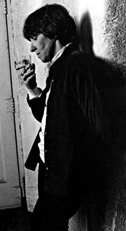
Comment
on this story
What:
Moe Tucker with the Fairmount Girls
When:
Saturday, Feb. 16 at 9 p.m.
Where:
The Pilot Light
Cost:
$10
|
|

The Velvet Underground's Moe Tucker still loves rock 'n' roll
by Jesse Fox Mayshark
The Moe Tucker Story would be a great movie for someone to make, HBO or Showtime or (God forbid) VH-1.
The pitch would go something like this: innocent Catholic teenage girl hooks up with Greenwich Village bohemians, joins rock 'n' roll band, plays drums on some of the greatest music recorded anywhere in the 20th century, then packs it in, gets married, has kids, gets divorced, winds up supporting her family on miserable wages at a Wal-Mart in dead-end Douglas, Ga., records beautifully angry low-budget albums about supporting a family on miserable wages, reunites with old rock 'n' roll friends, tours the world, gets inducted into Rock 'n' Roll Hall of Fame, settles into semi-retired life of recording and touring, winds up playing Knoxville, Tenn. on Feb. 16, 2002.
"I haven't done much of that [touring] in a while," she says by phone from her home in south-central Georgia. "My mom died about three years ago, and it really threw me for a loop...I wanna be doing more, I'm just being a jerk."
Maureen "Moe" Tucker played drums and, sometimes, sang on the songs recorded in the mid- to late-'60s by the Velvet Underground. They never made the charts, but the Velvets—under the leadership of Lou Reed and the patronage of Andy Warhol, who produced their first album and designed its famous banana cover—released four stunning albums that were, individually and collectively, among the greatest works of their era. That first record in particular, The Velvet Underground and Nico, turns up on pretty much every "Greatest Albums of All Time" list you can name. Among the many who have followed in one or another of their giant steps are David Bowie, Big Star, Patti Smith, Sonic Youth, R.E.M. and Cowboy Junkies (whose first hit was a cover of the Velvets' "Sweet Jane").
"It was fun," Tucker says simply, the bluntness in her New York accent barely softened by her 18 years in Georgia. "My biggest memories of all that was we really had fun. Andy was fun, and all the people who hung around were interesting."
Tucker was an unlikely bohemian by her own account, a devout churchgoing teenager. But she loved rock 'n' roll. When her childhood friend Sterling Morrison hooked up with Reed to form a band, and the band subsequently found itself short a drummer for an early gig, "someone said, 'Hey, Moe plays drums.'...I was just supposed to play that one show," she says. "But it just went on from there."
Tucker's influence is inestimable. Those are her insistent, pounding beats behind Reed's deadpan vocals on songs like "Heroin" and "I'm Waiting for the Man" and the unhinged squall of the 17-minute noise orgy "Sister Ray" (for endurance and sheer blazing power, one of the greatest bursts of drumming on record). She taught herself drums sitting in her room, banging along to early Rolling Stones and Bo Diddley records. She brought the same urgency to the Velvet Underground, a propulsive jitter with roiling downbeats. It would be too easy to call her playing primitive; "intuitive" is closer, but it still doesn't convey her ferocious creativity. When she thought the song required it, Tucker would flip her bass drum on its side and pound it with mallets, or bang on garbage cans or anything else available.
And that's her plaintive, vulnerable voice on Reed's lovely "After Hours"—"All the people are dancing and they're having such fun and I wish it could happen to me..." she sings, a stand-in for every lonely person in every lonely bar in the world. Her warm, flattened vocals and her hesitant wistfulness practically invented a new way of female singing; she gave voice to the everygirls, the ones who wanted to belong but didn't quite fit in. You can hear it echoed by most of the punk and postpunk female artists who came after.
Her solo work of the past 10 years has the same qualities. By turns scabrous ("I'm fired up/Pissed off/Tired and I'm mad"), reflective ("I wanna ride, but I'm afraid of the horse") and lovely (her perfect covers of girl-group classics like "Be My Baby" and "Then He Kissed Me"), it's the work of a woman well past disillusionment but still hanging on just for the hell of it. Her kids are all grown now, and she hopes to get out of her stultifying small town (which is dominated culturally and commercially by her ex-employer: "I sure am sick of giving them all my money," she says. "I hate Wal-Mart. I hate them."). This tour, which started with a couple of gigs with her old friend Jonathan Richman, is her latest step.
Tucker's still in touch with the surviving Velvets (Morrison played in her touring band until his death a few years ago). When she started writing songs about 15 years ago, she says Reed was her biggest booster—"I thought, if Lou thinks it's all right, it must be all right," she says. As a bandleader, Tucker attacks her vocals and rhythm guitar with the same determination she used to drive the Velvet Underground. She's not sure where it comes from, this almost uncontrollable physical reaction music provokes in her—which is why she limits her exposure to it.
"I don't often listen to music," she says. "Even when I was younger this was the case, I've never just sat and listened to music. I would have to be thumping on something. It's almost painful to me. There's no way I could put on 'Be My Baby' and just go about my business.
"I can't imagine putting on 'Be My Baby' and then vacuuming, you know?"

January 14, 2002 * Vol. 12, No. 7
© 2002 Metro Pulse
|